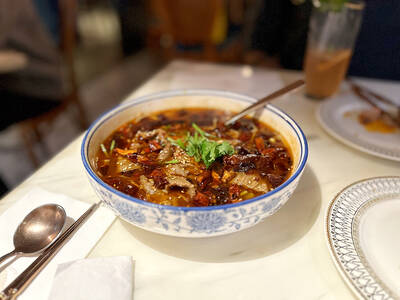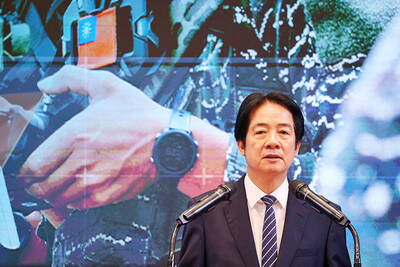Those familiar with Jerome Keating’s work, whether through his previous books or regular op-eds in the Taipei Times, will already know his political stance. He is very open about it, and Taiwan: The Struggle Gains Focus is very much about his opinions and ideas, especially his scathing distaste for the Chinese Nationalist Party (KMT) and the Chinese Communist Party (CCP), which he calls “Pigs-1” and “Pigs-2,” respectively, in one essay.
In another, he writes, “Those KMT who support the so-called 1992 consensus could consider moving to Kinmen and Matsu. From there, they could renew the ‘consensus’ with China and even continue to promote the idea of ‘one China with different interpretations.’”
There’s nothing wrong with that, since the book is honest and does not pretend to be what it’s not. Keating does acknowledge that there are those who don’t agree with him, but the bottom line is he will defend the nation’s democracy and sovereignty against those — including Taiwanese — who seek to undermine it for whatever reason.
Keating’s position is one that more people in Taiwan seem to share, as evidenced from recent polls and election results. A survey from earlier this month shows a record number of people identifying as Taiwanese rather than Chinese, and with China continuing to threaten Taiwan’s existence and vibrant democracy, this sentiment will only grow among the younger generation. Keating calls them “Generation D,” who grew up only knowing a democratic Taiwan and carry less baggage from its convoluted past.
Thus, it is a worthy exercise to examine Taiwan’s identity and internal struggles from this framework to provide ideas on how the nation can move forward. It’s evident that Keating deeply cares for Taiwan and is concerned about its future, and while his ideas may be overly idealistic at times, Taiwan: The Struggle Gains Focus is a well-intentioned and thought-provoking read for those with a vested interest in Taiwan.
The book takes on a casual, commentary style that espouses Keating’s views on a wide range of matters related to the theme, and although it introduces certain concepts that may require some academic knowledge, the prose is easily digestible as he peppers it with pop, literary and philosophical references.
While Keating does a concise and fairly accurate job at summarizing Taiwan’s history and recent politics within the first 50 pages (which is not an easy task), the nation’s past and present complexities are such that one will need some existing knowledge before tackling the book. But a reader likely wouldn’t pick it up otherwise. There was only one noticeable error: the Pingpu people are not a single tribe, but rather a collective term for several distinct indigenous groups that are fighting for government recognition.
Part I, “Taiwan’s Continuing Search for Identity,” is the most intriguing. It takes a deep look at the existing divisions in Taiwanese society that prevent its people from uniting and moving forward as a whole. What sets Taiwan apart from China, which claims that “we are all Chinese,” and how can its people develop a distinct but cohesive identity to counter such notions? He covers his bases and provides context in relation to Chinese history, which is needed to see the big picture especially since the book provides a crucial viewpoint that often gets drowned out by China’s propaganda.
Keating writes that the quest for identity includes examining and understanding Taiwan’s past, all the way back to the Austronesian expansion — something that even a significant portion of Taiwanese remain unclear about due to decades of colonizers steering the narrative to their favor. One point that stands out is Taiwan’s need for its own epic — namely, the “out of Taiwan” epic since the island is considered to be a key point of expansion for the Austronesian peoples who eventually spread as far as Madagascar and Hawaii.
The argument that Taiwan should embrace its Austronesian past to further distance itself from China is one that is often heard and sounds great on paper. But given the violent history between today’s majority Han Taiwanese settlers and the culturally marginalized Aborigines, as well as ongoing issues of discrimination and Han superiorirty today, it’s a loaded task even if 85 percent of Taiwanese today can claim some Aboriginal ancestry.
That said, those who have read Keating’s The Paradigms that Guide Our Lives and Drive Our Souls, or are familiar with his op-eds, should know that he has high hopes for humanity’s ability to one day set aside its differences, unite and see the world as a global home and themselves as a global race.
It’s a worthy goal to strive for, and the human race will go nowhere if it comprises entirely of pessimists. While the world is a mess right now, Taiwan remains one of its few beacons of progressiveness and democratic values despite its international isolation. Why not start here? Keating explores the nation’s place in the grand scheme of his paradigms through his essays in Part III.
The bulk of the remainder of the book is a collection of political essays that Keating has published in the Taipei Times over the past few years, covering a broad range of highly-relevant topics that all touch on Taiwanese identity as well as its past and future in relation to the world, especially China. This format seems a bit disjointed at first, but as one reads on, the arrangement of these sketches does make sense as they merge into a larger picture of the various concepts Keating tries to convey.
While they are well-written with clear viewpoints that provide valuable insight, the book can get repetitive because Keating espouses similar ideas in many pieces. For example, the phrase “Taiwan is a mid-sized nation...” appears at least 15 times.
The essays are meant to be viewed as individual pieces, but some general editing would have been helpful to streamline the read as a full-length book. Or one could just take their time with it because the format allows for flexible reading, completing a section at a time.
The book fully shows Keating’s passion for Taiwan, and anyone interested in the non-Beijing, non-KMT narrative of the nation but does not want to tackle an academic book should give it a read.

The government released figures for October showing that, year on year, exports increased 49 percent to a record US$61.8 billion for the month. The dramatic increases were partly due to fall being the high season, but largely due to the AI boom driving demand for exports, which many investors fear is rapidly turning into a massive bubble. An editorial in this newspaper last month warned that the government should be ready in case the boom turns to bust. In previous boom-bust cycles, from shoes and textiles, through computer parts and accessories, to tools, bicycles and sporting goods, Taiwan has survived in

Nov. 30 to Dec. 6 It is said that those who refused to vacate Kipatauw’s upper settlement were knocked unconscious by Japanese agents and dragged to fingerprint the deeds. The Japanese coveted the site’s valuable white clay for Beitou District’s (北投) growing ceramics industry, and they were determined to acquire it by any means. The Indigenous Ketagalan settlement of Kipatauw had withstood centuries of external pressures and cultural erosion. Despite gradually losing much of their territory to Han settlers, they remained distinct into the early 20th century. By 1895, three communities persisted: the upper settlement near

Spicy, scarlet red Sichuan food isn’t normally my suggestion for a first date. But hear me out, if you can both handle a three-chili rating, this spot could be the one. The vibe is intimate and in-the-know cool, the food is fantastic and will spur many a conversation, the cocktail list is wacky and fun — and they do offer free mouthwash in the restroom. Old Seat (老位) is tucked down an unassuming alleyway in the bustling Zhongxiao Dunhua (忠孝敦化) area, warm red lighting and fairy lights leading the way. It’s elegant, overtly hipster and even our table by the

This week, President William Lai (賴清德) and his administration launched a major publicity blitz to drum up support for a proposed NT$1.25 trillion (US$40 billion) special defense budget. This was well-planned and executed, and politically astute, but it is still far from becoming a reality: He needs to convince the opposition-controlled legislature to pass it. The chance that the Chinese Nationalist Party (KMT) and Taiwan People’s Party (TPP) legislative caucuses vote to approve everything that the administration wants is low, but Lai and his team have gone to great lengths to optimize the chances of getting some, or even most